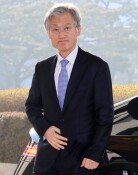UAE president’s visit to former Pres. Lee Myung-bak’s residence
UAE president’s visit to former Pres. Lee Myung-bak’s residence
Posted June. 01, 2024 07:59,
Updated June. 01, 2024 07:59
#1. After South Korean President Yoon Suk Yeol’s state visit to the United Arab Emirates (UAE) in January last year, members of the presidential office developed positive opinions about former President Lee Myung-bak. Some even suggested that Lee should serve as a special envoy to the Middle East. When this was reported, they received emails in crude language, questioning their sanity.
As it was reported later, Lee indeed contributed to the scenes. The then-Chief Presidential Secretary Kim Dae-ki visited the UAE and delivered a handwritten letter from Lee, coordinating between the two sides as President Yoon's special envoy. The president of the UAE, Mohammed bin Zayed Al Nahyan, told Kim that he would definitely visit South Korea to meet with Lee.
President Yoon gave 100 presidential watches to South Korean workers at the Barakah Nuclear Power Plant. They were carried by Code One of the South Korean Air Force and delivered to the power plant with much care. The number 100 was engraved as a symbol of respect for the fact that their hard work ensures trust between South Korea and the UAE. Even after President Yoon returned, 1,000 olive trees presented by President Muhammad to South Korea remained a symbol of such trust. Olive trees symbolize abundance and prosperity in the Middle East.
#2. On May 29, 2024, UAE President Muhammad visited South Korea. He visited former President Lee’s residence and embraced him, saying, “Oh my God, my friend.” The UAE president, who had a busy schedule as the leaders of large companies, including Lee Jae-yong, Chung Eui-sun, and Chey Tae-won, lined up to meet him, kept his promise by visiting his old friend’s house. Such deep trust built over a long time represents an intangible asset that cannot be bought with money.
This is not to flatter Lee. This is about what we miss when we generalize and judge a person based on one incident or in a certain frame. The opposition party heavily criticizes Lee as a ‘criminal,’ but he certainly has both merits and demerits. We might be able to see a person as a whole, not in a way that we prematurely presume, only when the foundation to holistically view his or her merits and demerits is created, rather than focusing on making extreme condemnation and instigation.
Under South Korea’s five-year single-term system for the presidency, political parties frantically try to tear down their competitors’ legacy to gain power. The previous administrations imprisoned former Presidents Park Geun-hye and Lee Myung-bak and the large opposition party is taking similar steps by mentioning the impeachment of the president. Some ruling party members are putting pressure to dig out the faults of the previous administration. The authorities don’t seem to mind such a practice of dragging down the competing party. The politics of hatred and rejection by demonizing each other won’t be welcomed by people or bring development for the future.





![[천광암 칼럼]장동혁은 대체 왜 이럴까](https://dimg.donga.com/c/138/175/90/1/wps/NEWS/IMAGE/2026/02/22/133399127.1.jpg)

